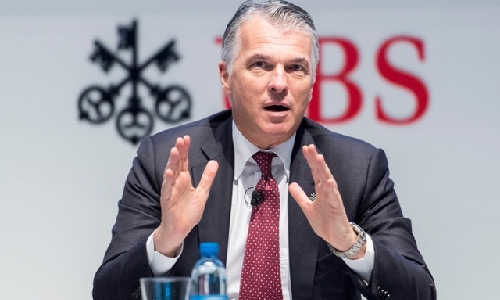Sergio Ermotti: Watch Out for London
UBS CEO Sergio Ermotti is watching Britain's private banking sector with a wary eye – especially following its exit from the European Union.
Switzerland is the world's largest offshore center in the world with an estimated $2.3 trillion in assets, but Asia's combined Singapore and Hong Kong assets already pip the alpine nation. According to UBS boss Sergio Ermotti, Switzerland also needs to watch out for would-be ally U.K., as it prepares to leave the European Union.
«Our point of reference... in our time zone in terms of our benchmark on regulation and ease doing business has to be the U.K., particularly post-Brexit,» Ermotti said on Wednesday at this year's Annual Meeting of the Swiss Finance Institute in Zurich. Switzerland initially sought to ally itself with London as «rogue» financial centers outside the bloc.
Frank Policy Views
The efforts foundered as the terms of Britain's exit gripped Brussels instead. Britain's $300 billion in offshore funds pale in comparison to Switzerland – and indeed even compared to the $500 billion managed in the Channel Islands. But London is where Zurich and Geneva need to focus their attention, Ermotti said.
«I believe while we're going to have some alignment of interests with the U.K., post -Brexit, but at the end of the day, they are gonna want to compete with us so we better watch the situation,» Ermotti said.
«Not Doing So Well»
He was responding to concerns that Switzerland will lose its crown as the world's wealth management center following seismic changes including the abandonment of banking secrecy rules. Ermotti, a 59-year-old Swiss banker who has run UBS since 2011, was frank in political views.
«I think one of the first issues we need to realize in Switzerland is we cannot continue to benchmark ourselves around our neighboring countries – they’re not doing so well,» Ermotti said. «By accepting that this is our reference point, we are dragged down to a comparison that doesn’t really fit what we want to and should be,» Ermotti said.
Finance vs Wider Economy
Amid a troubled wider eurozone, Switzerland's economic prospects remain intact – UBS predicts economic growth of 0.9 percent next year. The Swiss franc remains hamstrung by the weak European currency.
Swiss banks including UBS have been hammered with charges on Swiss franc deposits, an additional tool Swiss policymakers have seized in a bid to prevent flight into the currency. «We need to be less complacent and really understand, the financial center has been crucial in allowing the economy to stay competitive, Ermotti noted.



























